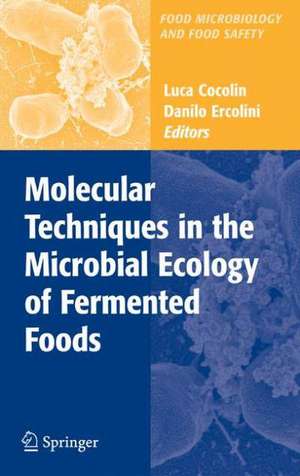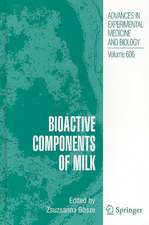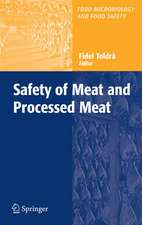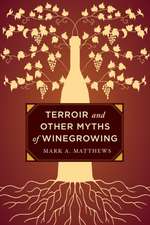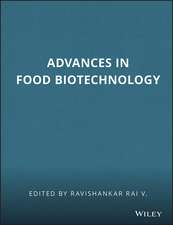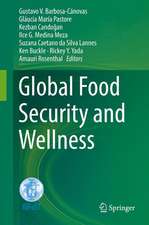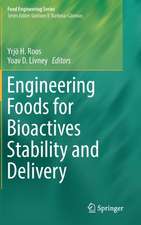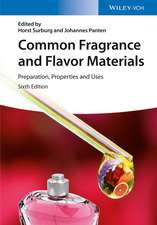Molecular Techniques in the Microbial Ecology of Fermented Foods: Food Microbiology and Food Safety
Editat de Luca Cocolin, Danilo Ercolinien Limba Engleză Paperback – 19 noi 2010
| Toate formatele și edițiile | Preț | Express |
|---|---|---|
| Paperback (1) | 1107.73 lei 6-8 săpt. | |
| Springer – 19 noi 2010 | 1107.73 lei 6-8 săpt. | |
| Hardback (1) | 1113.89 lei 6-8 săpt. | |
| Springer – 9 noi 2007 | 1113.89 lei 6-8 săpt. |
Din seria Food Microbiology and Food Safety
- 18%
 Preț: 1396.43 lei
Preț: 1396.43 lei - 20%
 Preț: 565.93 lei
Preț: 565.93 lei - 18%
 Preț: 1244.89 lei
Preț: 1244.89 lei - 15%
 Preț: 639.73 lei
Preț: 639.73 lei - 18%
 Preț: 785.86 lei
Preț: 785.86 lei - 15%
 Preț: 709.44 lei
Preț: 709.44 lei - 18%
 Preț: 951.29 lei
Preț: 951.29 lei - 18%
 Preț: 1118.75 lei
Preț: 1118.75 lei -
 Preț: 389.70 lei
Preț: 389.70 lei - 5%
 Preț: 398.11 lei
Preț: 398.11 lei - 15%
 Preț: 633.68 lei
Preț: 633.68 lei - 18%
 Preț: 1384.26 lei
Preț: 1384.26 lei - 18%
 Preț: 1486.83 lei
Preț: 1486.83 lei - 23%
 Preț: 906.44 lei
Preț: 906.44 lei -
 Preț: 389.88 lei
Preț: 389.88 lei - 18%
 Preț: 782.87 lei
Preț: 782.87 lei - 18%
 Preț: 1111.97 lei
Preț: 1111.97 lei - 15%
 Preț: 645.28 lei
Preț: 645.28 lei - 18%
 Preț: 722.58 lei
Preț: 722.58 lei - 18%
 Preț: 771.49 lei
Preț: 771.49 lei - 15%
 Preț: 712.05 lei
Preț: 712.05 lei - 18%
 Preț: 892.42 lei
Preț: 892.42 lei - 15%
 Preț: 471.53 lei
Preț: 471.53 lei - 18%
 Preț: 1228.29 lei
Preț: 1228.29 lei - 18%
 Preț: 1236.51 lei
Preț: 1236.51 lei - 18%
 Preț: 1388.68 lei
Preț: 1388.68 lei - 5%
 Preț: 718.65 lei
Preț: 718.65 lei - 18%
 Preț: 1217.41 lei
Preț: 1217.41 lei - 18%
 Preț: 1386.92 lei
Preț: 1386.92 lei - 18%
 Preț: 796.76 lei
Preț: 796.76 lei
Preț: 1107.73 lei
Preț vechi: 1350.89 lei
-18% Nou
Puncte Express: 1662
Preț estimativ în valută:
212.03€ • 230.39$ • 178.22£
212.03€ • 230.39$ • 178.22£
Carte tipărită la comandă
Livrare economică 21 aprilie-05 mai
Preluare comenzi: 021 569.72.76
Specificații
ISBN-13: 9781441925602
ISBN-10: 1441925600
Pagini: 292
Ilustrații: XII, 280 p.
Dimensiuni: 155 x 235 x 15 mm
Greutate: 0.41 kg
Ediția:Softcover reprint of hardcover 1st ed. 2008
Editura: Springer
Colecția Springer
Seria Food Microbiology and Food Safety
Locul publicării:New York, NY, United States
ISBN-10: 1441925600
Pagini: 292
Ilustrații: XII, 280 p.
Dimensiuni: 155 x 235 x 15 mm
Greutate: 0.41 kg
Ediția:Softcover reprint of hardcover 1st ed. 2008
Editura: Springer
Colecția Springer
Seria Food Microbiology and Food Safety
Locul publicării:New York, NY, United States
Public țintă
ResearchCuprins
Molecular Techniques in Food Fermentation: Principles and Applications.- Dairy Products.- Fermented Meat Products.- Sourdough Fermentations.- Vegetable Fermentations.- Wine Fermentation.- Beer Production.- Other Fermentations.- Probiotics: Lessons Learned from Nucleic Acid-based Analysis of Bowel Communities.- Bioinformatics for DNA Sequence-based Microbiota Analyses.- Role of Bacterial ‘Omics’ in Food Fermentation.
Textul de pe ultima copertă
Thanks to the application of methods allowing precise imaging of microbial ecology, the field of food fermentation has experienced exponential growth in the last few years. This has resulted in the availability of new information on the structure and dynamics of the microbial populations during fermented food production.
Molecular Methods and Microbial Ecology of Fermented Foods presents the latest findings in microbial ecology as determined by the application of molecular methods, reports the most recent advances in the field, and offers details on primers and protocols most suitable for studying specific food ecosystems. It provides analytical details and suggestions useful in research, as well as evaluation of the criticism of using novel approaches in food fermentation microbiology. This book also discusses new insights drawn from the use of bio-molecular techniques in the microbial ecology of fermented foods.
About the Authors:
Luca Cocolin is an associate professor at the University of Turin, Italy.
Danilo Ercolini is a researcher at University of Naples Federico II, Naples, Italy
Molecular Methods and Microbial Ecology of Fermented Foods presents the latest findings in microbial ecology as determined by the application of molecular methods, reports the most recent advances in the field, and offers details on primers and protocols most suitable for studying specific food ecosystems. It provides analytical details and suggestions useful in research, as well as evaluation of the criticism of using novel approaches in food fermentation microbiology. This book also discusses new insights drawn from the use of bio-molecular techniques in the microbial ecology of fermented foods.
About the Authors:
Luca Cocolin is an associate professor at the University of Turin, Italy.
Danilo Ercolini is a researcher at University of Naples Federico II, Naples, Italy
Caracteristici
Presents insights into microbial ecology of fermented foods Discuss the applications of molecular methods in relation to studying fermentation Includes supplementary material: sn.pub/extras
